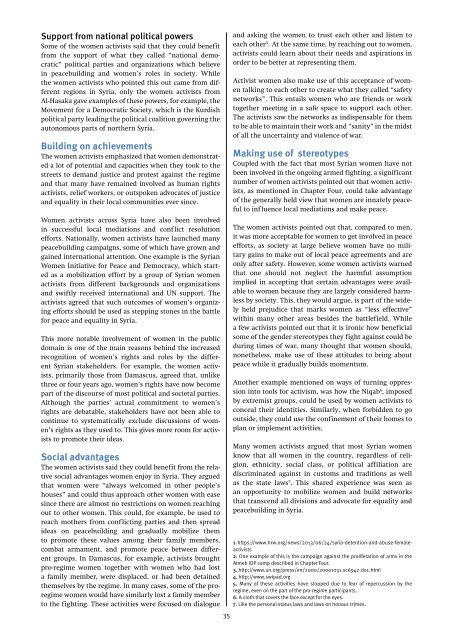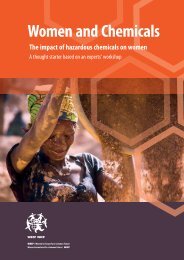future now”
YAO19
YAO19
You also want an ePaper? Increase the reach of your titles
YUMPU automatically turns print PDFs into web optimized ePapers that Google loves.
Support from national political powers<br />
Some of the women activists said that they could benefit<br />
from the support of what they called “national democratic”<br />
political parties and organizations which believe<br />
in peacebuilding and women’s roles in society. While<br />
the women activists who pointed this out came from different<br />
regions in Syria, only the women activists from<br />
Al-Hasaka gave examples of these powers, for example, the<br />
Movement for a Democratic Society, which is the Kurdish<br />
political party leading the political coalition governing the<br />
autonomous parts of northern Syria.<br />
Building on achievements<br />
The women activists emphasized that women demonstrated<br />
a lot of potential and capacities when they took to the<br />
streets to demand justice and protest against the regime<br />
and that many have remained involved as human rights<br />
activists, relief workers, or outspoken advocates of justice<br />
and equality in their local communities ever since.<br />
Women activists across Syria have also been involved<br />
in successful local mediations and conflict resolution<br />
efforts. Nationally, women activists have launched many<br />
peacebuilding campaigns, some of which have grown and<br />
gained international attention. One example is the Syrian<br />
Women Initiative for Peace and Democracy, which started<br />
as a mobilization effort by a group of Syrian women<br />
activists from different backgrounds and organizations<br />
and swiftly received international and UN support. The<br />
activists agreed that such outcomes of women’s organizing<br />
efforts should be used as stepping stones in the battle<br />
for peace and equality in Syria.<br />
This more notable involvement of women in the public<br />
domain is one of the main reasons behind the increased<br />
recognition of women’s rights and roles by the different<br />
Syrian stakeholders. For example, the women activists,<br />
primarily those from Damascus, agreed that, unlike<br />
three or four years ago, women’s rights have now become<br />
part of the discourse of most political and societal parties.<br />
Although the parties’ actual commitment to women’s<br />
rights are debatable, stakeholders have not been able to<br />
continue to systematically exclude discussions of women’s<br />
rights as they used to. This gives more room for activists<br />
to promote their ideas.<br />
Social advantages<br />
The women activists said they could benefit from the relative<br />
social advantages women enjoy in Syria. They argued<br />
that women were “always welcomed in other people’s<br />
houses” and could thus approach other women with ease<br />
since there are almost no restrictions on women reaching<br />
out to other women. This could, for example, be used to<br />
reach mothers from conflicting parties and then spread<br />
ideas on peacebuilding and gradually mobilize them<br />
to promote these values among their family members,<br />
combat armament, and promote peace between different<br />
groups. In Damascus, for example, activists brought<br />
pro-regime women together with women who had lost<br />
a family member, were displaced, or had been detained<br />
themselves by the regime. In many cases, some of the proregime<br />
women would have similarly lost a family member<br />
to the fighting. These activities were focused on dialogue<br />
35<br />
and asking the women to trust each other and listen to<br />
each other 5 . At the same time, by reaching out to women,<br />
activists could learn about their needs and aspirations in<br />
order to be better at representing them.<br />
Activist women also make use of this acceptance of women<br />
talking to each other to create what they called “safety<br />
networks”. This entails women who are friends or work<br />
together meeting in a safe space to support each other.<br />
The activists saw the networks as indispensable for them<br />
to be able to maintain their work and “sanity” in the midst<br />
of all the uncertainty and violence of war.<br />
Making use of stereotypes<br />
Coupled with the fact that most Syrian women have not<br />
been involved in the ongoing armed fighting, a significant<br />
number of women activists pointed out that women activists,<br />
as mentioned in Chapter Four, could take advantage<br />
of the generally held view that women are innately peaceful<br />
to influence local mediations and make peace.<br />
The women activists pointed out that, compared to men,<br />
it was more acceptable for women to get involved in peace<br />
efforts, as society at large believe women have no military<br />
gains to make out of local peace agreements and are<br />
only after safety. However, some women activists warned<br />
that one should not neglect the harmful assumption<br />
implied in accepting that certain advantages were available<br />
to women because they are largely considered harmless<br />
by society. This, they would argue, is part of the widely<br />
held prejudice that marks women as “less effective”<br />
within many other areas besides the battlefield. While<br />
a few activists pointed out that it is ironic how beneficial<br />
some of the gender stereotypes they fight against could be<br />
during times of war, many thought that women should,<br />
nonetheless, make use of these attitudes to bring about<br />
peace while it gradually builds momentum.<br />
Another example mentioned on ways of turning oppression<br />
into tools for activism, was how the Niqab 6 , imposed<br />
by extremist groups, could be used by women activists to<br />
conceal their identities. Similarly, when forbidden to go<br />
outside, they could use the confinement of their homes to<br />
plan or implement activities.<br />
Many women activists argued that most Syrian women<br />
know that all women in the country, regardless of religion,<br />
ethnicity, social class, or political affiliation are<br />
discriminated against in customs and traditions as well<br />
as the state laws 7 . This shared experience was seen as<br />
an opportunity to mobilize women and build networks<br />
that transcend all divisions and advocate for equality and<br />
peacebuilding in Syria.<br />
1. https://www.hrw.org/news/2013/06/24/syria-detention-and-abuse-femaleactivists<br />
2. One example of this is the campaign against the proliferation of arms in the<br />
Atmeh IDP camp described in Chapter Four.<br />
3. http://www.un.org/press/en/2000/20001031.sc6942.doc.html<br />
4. http://www.swipad.org<br />
5. Many of these activities have stopped due to fear of repercussion by the<br />
regime, even on the part of the pro-regime participants.<br />
6. A cloth that covers the face except for the eyes.<br />
7. Like the personal status laws and laws on honour crimes.



